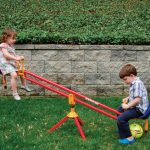 Raising super kids should be an empowering not daunting experience. One that brings the whole family closer together and results in future adults who are happy, healthy, self-confident and have what is often called “the winner’s edge.” “Parents need to begin at an early age to teach children essential life skills so that their children will be raised by the values and beliefs of their own family, not by the values or beliefs of friends, professors or society in general,” says Lisette Beraja, LMFT of Beraja Counseling Center.
Raising super kids should be an empowering not daunting experience. One that brings the whole family closer together and results in future adults who are happy, healthy, self-confident and have what is often called “the winner’s edge.” “Parents need to begin at an early age to teach children essential life skills so that their children will be raised by the values and beliefs of their own family, not by the values or beliefs of friends, professors or society in general,” says Lisette Beraja, LMFT of Beraja Counseling Center.
Dr. Josefina Estrella, School Counselor for Grades K-5th at Key Biscayne K-8 Center agrees. “From the day a child arrives to this world, he or she starts learning important things that will help shape the kind of person they will become,” she says. “For example, the way a parent tends to the needs of their newborn baby sends a message of love and care that builds the child’s trust in other human beings. Later on, this child will need to trust others to be able to make and keep friends. Even without noticing, and from very early on, parents are teaching and modeling behaviors. Also, having some rules and following a positive discipline system at home can help children learn about positive and negative consequences, about the laws of life.”
 One of the most important skills children need to learn in order to become healthy, balanced adults, is that of “frustration tolerance,” advises Licensed Psychologist Dr. Gregg A. Pizzi. “This means being able to cope effectively with not getting what we want,” he says. “Often, parents who are well-intentioned make the mistake of avoiding saying ‘no’ to their kids, thinking that they will be giving them more love that way. It’s quite the contrary, however…being able to tell your child ‘no’, and allowing them to feel the discomfort and pain of disappointment from time to time, is the caring thing to do so that they grow into adults who can modulate their emotions and behavior.”
One of the most important skills children need to learn in order to become healthy, balanced adults, is that of “frustration tolerance,” advises Licensed Psychologist Dr. Gregg A. Pizzi. “This means being able to cope effectively with not getting what we want,” he says. “Often, parents who are well-intentioned make the mistake of avoiding saying ‘no’ to their kids, thinking that they will be giving them more love that way. It’s quite the contrary, however…being able to tell your child ‘no’, and allowing them to feel the discomfort and pain of disappointment from time to time, is the caring thing to do so that they grow into adults who can modulate their emotions and behavior.”
So at what age should parents start teaching their children about fitness, being social, eating right, making and keeping friends, falling in love, etiquette, financial responsibility, charity, etc? “Every opportunity you have with your children is a learning moment,” says Beraja. “This is why I always stress quality of time being far more superior to quantity of time. Talk about making friends and making good choices. Talk about what is and isn’t healthy to eat. Discuss present-day financial matters. Teach to give to others in greater need. Stay active physically because it’s healthy. Set the example today for your children and they will follow.”
 What’s more, a child’s role in the household should always be defined. “Each child should know what their special significance is in the family unit,” says Jeraldine H. Bowden, School Counselor at Key Biscayne K-8 Center. “In other words, what unique characteristic do they contribute and what are their strengths. All children should contribute to the smooth flow of the home. No matter how small, each child should have a job that needs to be done. Jobs should rotate and be genuinely necessary.” As such, a weekly family meeting should be held where children learn how to communicate their needs respectfully to parents and siblings. “Negotiations, problem-solving, logical and natural consequences are all a part of family meetings,” she says.
What’s more, a child’s role in the household should always be defined. “Each child should know what their special significance is in the family unit,” says Jeraldine H. Bowden, School Counselor at Key Biscayne K-8 Center. “In other words, what unique characteristic do they contribute and what are their strengths. All children should contribute to the smooth flow of the home. No matter how small, each child should have a job that needs to be done. Jobs should rotate and be genuinely necessary.” As such, a weekly family meeting should be held where children learn how to communicate their needs respectfully to parents and siblings. “Negotiations, problem-solving, logical and natural consequences are all a part of family meetings,” she says.
Looking ahead, how exactly can parents create lifelong learners? The first factor is debunking the myth that academic skills and knowledge are inherent. “The fact is that even the most gifted learners must apply effort to obtain results,” says Tracy LaFlamme Ortega, Founder & CEO of PREPWORKS. “Students who embrace the belief that their level of effort will positively affect their academic outcomes are not only the most resilient learners, but also lifelong and engaged learners. Sometimes children get caught in the trap of thinking: ‘I’m just not good at math’ or ‘That just comes easily to him’…those statements are just not accurate.”
Bowden goes on to offer some suggestions for making your family more well-rounded. “Expose them to museums, travel, great literature, good movies, cultural diversity, art appreciation, etc,” she says. “And read, read, read! To them and with them.”
 With all this focus on unending development, it’s important to remember that healthy children grow into healthy adults because they’re balanced. “As parents, we fear that our children won’t make it in the future because college and workforce entry is so competitive,” concludes South Florida-based Clinical Psychologist Dr. Elsa Orlandini. “Our fears manifest as trying to optimize our children’s potential to the point of exhaustion or ineffectiveness. Reaching a balance is difficult and it’s likely that parents may overdo it at some point in their child’s rearing. This is fixable and adjustable, but parents must be vigilant all the time. Make sure your child understands why they are doing what they are doing. And above all else, make sure your child doesn’t internalize messages that they have to be perfect to be loved.”
With all this focus on unending development, it’s important to remember that healthy children grow into healthy adults because they’re balanced. “As parents, we fear that our children won’t make it in the future because college and workforce entry is so competitive,” concludes South Florida-based Clinical Psychologist Dr. Elsa Orlandini. “Our fears manifest as trying to optimize our children’s potential to the point of exhaustion or ineffectiveness. Reaching a balance is difficult and it’s likely that parents may overdo it at some point in their child’s rearing. This is fixable and adjustable, but parents must be vigilant all the time. Make sure your child understands why they are doing what they are doing. And above all else, make sure your child doesn’t internalize messages that they have to be perfect to be loved.”
Raising Right
No article can cover everything on a topic as serious as raising children. The following books, e-books and audiobooks, offer comprehensive expert advice on parenting super kids.
 Super Secrets
Super Secrets
Listen to The Secrets Of Raising Super Kids in your spare time and let Brian Tracy help you raise exceptional children with high-levels of self-confidence and self-esteem who grow into capable, responsible adults.
 Intelligent Parents
Intelligent Parents
Eileen Kennedy-Moore & Mark Lowenthal guide parents through nurturing their child’s true potential in Smart Parenting For Smart Kids with a focus on the special challenges intelligent children face.
 Smart Baby
Smart Baby
What is the best way to get your children into the college of their choice? Teach them impulse control. John Medina’s Brain Rules For Baby takes parents through raising children during the formative ages up to 5.
 Early On
Early On
The authors of Raise A Smarter Child By Kindergarten believe that up to age 5, 30 IQ points can be at stake! Proper mental stimulation is critical during this peak period and this book is a great resource.
 Get Balanced
Get Balanced
There is more to life than just being smart. Elaine McEwan wants kids to be in balance — emotional, physical, social and spiritual. Raising Balanced Kids In An Unbalanced World provides the guidelines for stages.
 Real Life
Real Life
The alternative to weighty books by psychologists and child rearing experts, Gwendolyn Diaz mixes hilarious true stories with practical advice in her useful book Mighty Mom’s Secrets For Raising Super Kids.
 Daddy Knows
Daddy Knows
In the first decade, subconscious software is being written to last a lifetime. In One-Minute Super Dad, Dr. Prashant Jindal gives dads 99 things they can do to create a more positive outcome for their children.











